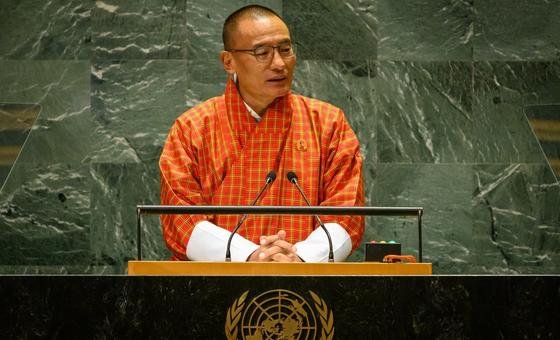Prime Minister Tobgay said that after more than 50 years, only seven countries have managed to get out of the least developed country (LDC) category. 46 countries are still part of this group and need for development.
Referring to his country’s development journey, he said that Bhutan became the 128th member of the United Nations in 1971, which was a very important moment for his countrymen.
A moment when “a small, poor, landlocked country, living in the lap of the world’s highest mountains, joins the world’s nations.”
In the same year, the United Nations established the Department for Least Developed Countries, which aims to provide targeted assistance to poor countries. Bhutan was among the first few countries in this group.
Prime Minister Tobgay noted that at the time the country’s per capita income was only $215, life expectancy was only 40 years, while the infant mortality rate was high, at 142 deaths per thousand births.
“Today, I stand here before you with a story of transformational change in progress.” Bhutan’s GDP has now reached three and a half thousand dollars, life expectancy is 70 years, the infant mortality rate has dropped to 15 per thousand births. The literacy rate has reached 71 percent, 99 percent among the youth.
Prime Minister Tobgay said that Bhutan will leave the list of least developed countries in December 2023 after 52 years of joining the United Nations.
He thanked development partners including United Nations and its various agencies, European Union, World Bank, Asian Development Bank, Japan and India for supporting this journey of development.
The Bhutanese leader said Bhutan, under the leadership of the monarchy, has adopted a philosophy based on the foundation of Gross National Happiness. It is a path where the happiness and welfare of the people of the country is prioritized in the development agenda.
“Bhutan’s economy may be small, but it is sustainable and inclusive. Health care and education are free for all. More than 72 percent of its land is covered by forests. “Bhutan is seen as a major center of biodiversity and is a carbon negative country.”
He said that to meet the new challenges, Bhutan needs to strengthen its economy, provide meaningful opportunities to the youth and adopt a new development model.
He called on the international community to help least developed countries get out of this category. The recently passed Memorandum of Understanding for the Future provides a roadmap for bringing about major changes in these vulnerable countries, but this will require new reforms in international organizations as needed.
Prime Minister Tobgay said Bhutan has been advocating for a more representative and effective Security Council for a long time. According to him, India has achieved strong economic progress and has led the global Southern Hemisphere countries and deserves a permanent seat in the Security Council. Likewise, Japan is a donor country and a peacemaker and should also be given permanent membership.

